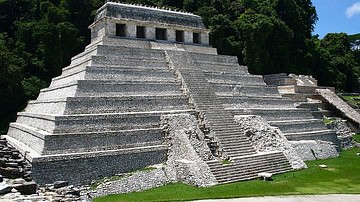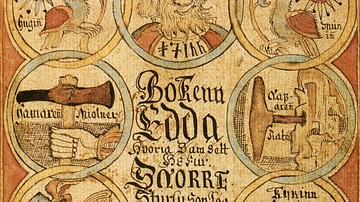Search
Did you mean: Symposium?
Search Results

Definition
Melusine
Melusine (pronounced Mel-ew-seen, also given as Melusina) is a legendary figure from European folklore depicted as a mermaid, sometimes with two tails, as a serpent from the waist down, or as a dragon. She is associated with the ruling houses...

Definition
Labyrinth
The word labyrinth comes from the Greek labyrinthos and describes any maze-like structure with a single path through it which differentiates it from an actual maze which may have multiple paths intricately linked. Etymologically the word...

Definition
Saxon Wars
The Saxon Wars (772-804) were a series of conflicts between the Franks under Charlemagne, who sought to conquer Saxony and convert the populace to Christianity, and the Saxons who resisted. The conflict lasted over 30 years through 18 campaigns...

Definition
Palenque
Located in the foothills of the Chiapas altiplano of modern Mexico, Palenque was an important Maya city which flourished between c. 600 and 750 CE. The name Palenque derives from the Spanish, meaning 'fortified place', but the original Maya...

Definition
Mystery Cults
Mystery cults, or mystery religions, were ancient religious associations characterized by secrecy and initiation rites. They typically surrounded one primary deity, but some mystery cults venerated multiple deities in their rites. Members...

Definition
Tibetan Book of the Dead
The Tibetan Book of the Dead is the English translation of the Tibetan texts known as bar-do thos-grol (Bardo Thodol) – “Liberation Through Hearing During the Intermediate State” – and serves as a guide for the soul of the deceased after...

Definition
Egyptian Faience
Egyptian faience is a glassy substance manufactured expertly by the ancient Egyptians. The process was first developed in Mesopotamia, first at Ur and later at Babylon, with significant results but faience production reached its height of...

Definition
Ghosts in the Ancient World
A belief in an afterlife was central to every major civilization of the ancient world and this encouraged the recognition of the reality of ghosts as the spirits of the departed who, for one reason or another, either returned from the realm...

Definition
Wheel of the Year
The Wheel of the Year is a symbol of the eight Sabbats (religious festivals) of Neo-Paganism and the Wicca movement which includes four solar festivals - Winter Solstice, Spring Equinox, Summer Solstice, Fall Equinox - and four seasonal festivals...

Definition
Edda
Edda is a term used to describe two Icelandic manuscripts that were copied down and compiled in the 13th century CE. Together they are the main sources of Norse mythology and skaldic poetry that relate the religion, cosmogony, and history...